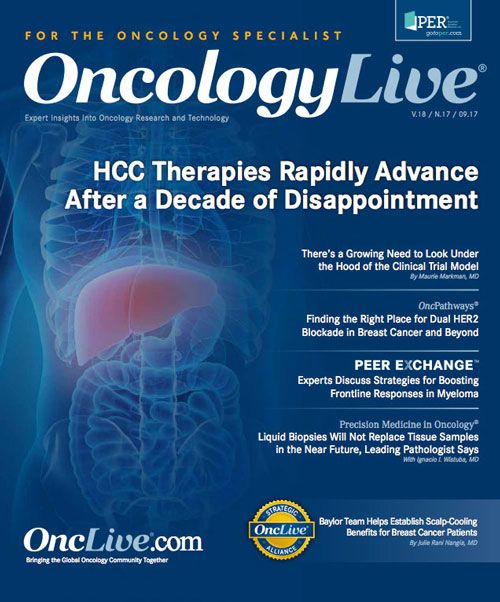AKT Inhibitor May Promote Better Responses to Abiraterone in mCRPC
Ipatasertib is being investigated in patients with metastatic castration-resistant prostate cancer as a method of simultaneously blocking a resistance mechanism to hormone therapy and improving responses to abiraterone.
Christopher J. Sweeney, MBBS
Ipatasertib is being investigated in patients with metastatic castration-resistant prostate cancer (mCRPC) as a method of simultaneously blocking a resistance mechanism to hormone therapy and improving responses to abiraterone (Zytiga). The novel small molecule, which targets the AKT node in the PI3K pathway, is being tested in combination with abiraterone and prednisone in the international phase III IPATential150 trial (NCT03072238).
The trial is seeking to recruit approximately 850 adult patients (≥18 years) with asymptomatic or mildly symptomatic previously untreated mCRPC. Tumor samples must be tested for phosphatase and tensin homolog (PTEN) loss on an immunohistochemistry (IHC) assay, as the study patients will be stratified by tumor PTEN status and the testing of the endpoints will be statistically assessed in the unselected and PTEN-loss populations independently (Figure).
Figure. Ipatasertib in Patients With mCRPC
“The proposition is that one of the resistance mechanisms to hormonal therapy is the activation of the PI3-kinase AKT pathway, a survival pathway that can be activated and drive cancer when the androgen receptor is blocked,” said Christopher J. Sweeney, MBBS, a medical oncologist at DanaFarber Cancer Institute and associate professor of medicine at Harvard Medical School, both in Boston. “It is hoped that by blocking one of these resistance mechanisms, it will augment the effectiveness of anticancer therapy and improve cancer control.”
Sweeney, who is an investigator on the trial and contributed to the study design, noted that patients can have various reactions to abiraterone in terms of its effectiveness. Some patients, he said, can have a good response for many months or years, some have a moderate response for a few months and then experience progressive disease, and others have very little benefit. However, Sweeney stressed that abiraterone is a well-tolerated and active drug for treating mCRPC overall, so the goal is to find a complementary agent to allow patients longer and more meaningful control of their cancer with the combination than they would with abiraterone alone.
Ipatasertib inhibits AKT, a key component of the PI3-kinase pathway that is dysregulated by the loss of the tumor-suppressor PTEN gene.1 “The cells get activated by various receptors that promote the growth of normal and cancer cells, and that triggers a series of processes that go outside the receptor into the cancer cell,” explained Sweeney. “They activate AKT, which then activates the production of genes and proteins that support cancer growth, and sometimes those pathways are superactivated and preferentially drive [growth of] cancer cells more than normal cells.”
This “superactivation” is predicated by loss of PTEN, which is one of the most common changes in patients with mCRPC.2 By inhibiting AKT, ipatasertib prevents this chain of signaling at the source, and keeps cancer cells from growing.
This mechanism of action for ipatasertib was demonstrated in the A. MARTIN study, which assessed radiographic progression-free survival (rPFS) and the relationship between PTEN expression by IHC and genomic loss of PTEN by fluorescence in situ hybridization and next-generation sequencing.2 Investigators randomized 253 patients with mCRPC who were previously treated with docetaxel to 3 arms: ipatasertib at 400 mg, ipatasertib at 200 mg, or placebo, all in combination with abiraterone and prednisone.
At the primary analysis, the investigators observed 173 rPFS events. PTEN status was evaluable by IHC in 165 cases (65%) and PTEN loss was seen in 71 cases (43%). Loss of PTEN was associated with a worse rPFS outcome in the placebo arm, but in both ipatasertib arms, rPFS improved among patients with PTEN loss, with a greater effect seen in the 400-mg dose arm.2 There was high concordance between the 3 testing methods.
Adverse effects related to ipatasertib are relatively mild, according to Sweeney, and include diarrhea and blood sugar elevation, but nothing that resulted in patients not being able to tolerate the drug.
The primary endpoint for IPATential150 is rPFS, since the purpose of the combination is to try to delay the appearance of further metastatic disease on scans. According to Sweeney, these results will be supported by measuring the evidence of benefit and quality of life and preventing the emergence of pain. The investigators will also be assessing overall survival, under the assumption that patients would live longer if they received this combination early in their therapy.
Ipatasertib is also being studied in other tumor types and indications, including as neoadjuvant therapy for triple-negative breast cancer (TNBC) and in locally advanced or metastatic TNBC. The phase II LOTUS trial investigated ipatasertib combined with paclitaxel as first-line treatment in patients with advanced TNBC; results showed that median PFS was longer in patients with PTEN-low tumors who received ipatasertib than in those who received a placebo (6.2 vs 3.7 months, respectively).3
“Many investigators around the world are excited about the potential for this study, and that’s why it’s getting such traction and why we’re going to activate it around the world,” Sweeney said.
References
- Ipatasertib (GDC-0068, RG7440). Genentech/Biooncology website. biooncology.com/pipeline-molecules/ipatasertib.html. Accessed August 11, 2017.
- De Bono JS, De Giorgi U, Massard C, et al. PTEN loss as a predictive biomarker for the Akt inhibitor ipatasertib combined with abiraterone acetate in patients with metastatic castration-resistant prostate cancer (mCRPC) [ESMO abstract 7180]. Ann Oncol. 2016;27(suppl 6): 243-265. doi: 10.1093/annonc/mdw372.
- Kim SB, Dent R, Im SA, et al. Ipatasertib plus paclitaxel versus placebo plus paclitaxel as first-line therapy for metastatic triple-negative breast cancer (LOTUS): a multicentre, randomised, double-blind, placebo-controlled, phase 2 trial. Lancet Oncol. 2017; pii: S1470- 2045(17)30450-30453. doi: 10.1016/S1470-2045(17)30450-3.




